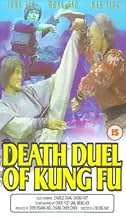DEATH DUEL OF KUNG FU (1979) is an unsung kung fu gem featuring two of the most dynamic Taiwan-based kung fu movie stars of the era, John Liu and Wong Tao, reunited here after their co-starring turn in the fan favorite SECRET RIVALS (1976). Like that film, this was shot in South Korea, although this film is actually set in China. The two stars are at their kung fu-fighting peak here and offer their fans a generous array of martial arts battles, both with each other and with a formidable array of opponents, all shot on Korean locations including the grounds of ancient Buddhist temples.
The story takes place in the early days of the Qing dynasty and follows the efforts of Ming patriot Shun Ching Kwei (Wong Tao) to join up with the exiled Ming forces on Taiwan after he kills the Qing field marshal. The character is a famed Southern fist fighter and is pursued by the Qings' hand-picked kung fu warriors. John Liu plays Sun Sen, the Northern kicking champion, who intervenes to help Wong Tao at key points, although his loyalties and motives aren't always clear. Wong is joined on his journey by a beautiful Japanese woman (who appears nude in one scene, her body adorned with snake tattoos) whose loyalties are also in question, although her feelings for Wong appear to be genuine.
The chief villain is Lord To Ko Lan, whose fighting skills pose such a threat to the two heroes that they realize they must join forces in order to beat him. Han Ying (aka Eagle Han Ying), who plays Lord To, is at least as good a fighter as his two co-stars (and possibly better), playing a master skilled enough to counter the crane fist techniques of the Southern champ and the high kicking of the Northern champ.
The story, written by Shaw Bros. house scribe I Kuang, takes its characters over vast distances yet manages to bring them together for a series of spectacular bouts, all staged by actors Chien Yuet San and Meng Hoi. The result, directed by Cheung Kay (aka Chang Chi), is a lean, stirring, well-photographed-and-directed kung fu movie with no fat and no waste. The only major distractions are the below-average English dubbing and the music soundtrack's reliance on long stretches lifted from Dominic Frontiere's score for the Clint Eastwood western, HANG 'EM HIGH (1968).





















